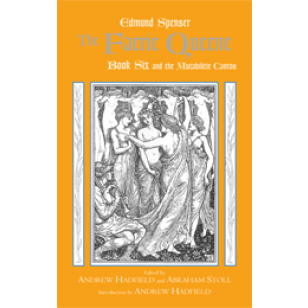The Faerie Queene, Book Six and the Mutabilitie Cantos
Book Six and the incomplete Book Seven of The Faerie Queene are the last sections of the unfinished poem to have been published. They show Spenser inflecting his narrative with an ever more personal note, and becoming an ever more desperate and anxious author, worried that things were falling apart as Queen Elizabeth failed in health and the Irish crisis became ever more terrifying. The moral confusion and uncertainty that Calidore, the Knight of Courtesy, has to confront are symptomatic of the lack of control that Spenser saw everywhere around him. Yet, within such a troubling and disturbing work there are moments of great beauty and harmony, such as the famous dance of the Graces that Colin Clout, the rustic alter ego of the poet himself, conjures up with his pipe. Book Seven, the "Two Cantos of Mutabilitie," is among the finest of Spenser's poetic works, in which he explains the mythical origins of his world, as the gods debate on the hill opposite his Irish house. Whether order or chaos triumphs in the end has been the subject of most subsequent critical debate.
eBook available for $11.95. Click HERE for more information.
The Faerie Queene from Hackett Publishing Company:
Spenser's great work in five volumes. Each includes its own Introduction, annotation, notes on the text, bibliography, glossary, and index of characters; Spenser's "Letter to Raleigh" and a short Life of Edmund Spenser appear in every volume.
---------
Book Six and the incomplete Book Seven of The Faerie Queene are the last sections of the unfinished poem to have been published. They show Spenser inflecting his narrative with an ever more personal note, and becoming an ever more desperate and anxious author, worried that things were falling apart as Queen Elizabeth failed in health and the Irish crisis became ever more terrifying. The moral confusion and uncertainty that Calidore, the Knight of Courtesy, has to confront are symptomatic of the lack of control that Spenser saw everywhere around him. Yet, within such a troubling and disturbing work there are moments of great beauty and harmony, such as the famous dance of the Graces that Colin Clout, the rustic alter ego of the poet himself, conjures up with his pipe. Book Seven, the "Two Cantos of Mutabilitie," is among the finest of Spenser's poetic works, in which he explains the mythical origins of his world, as the gods debate on the hill opposite his Irish house. Whether order or chaos triumphs in the end has been the subject of most subsequent critical debate.
Reviews:
"A thoughtful edition with just the right amount of annotation for a class on sixteenth century literature."
—Byron Nelson, West Virginia University
About the Author:
Abraham Stoll is Assistant Professor of English, University of San Diego.






